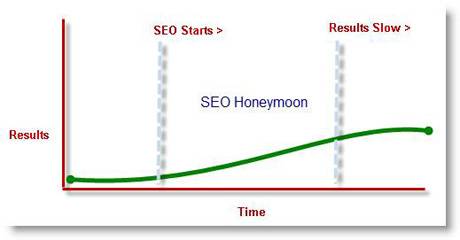To follow-up on my last SEO honeymoon post, I wanted to mention a few points that expand it a little and consider this scenario from the perspective from someone inheriting a site from another SEO agency or consultant.
I didn’t intend for this to be a two-part piece initially, but I thought it might be helpful to provide some pragmatic advice for those SEO consultants who feel that they’ve been there before or those that can see this sort of scenario playing out in their working career. So here goes…
A quick reminder: what is the SEO honeymoon?
Just to refresh, the SEO honeymoon is whereby relatively good results have been gained as a result of relatively easy tasks. The SEO honeymoon, in my mind, looks something like this:

Often this might be due to the site not originally being built to be accessible to bots or poor optimisation of prominent ranking factors such as the use of duplicate title tags, etc. The website therefore needs to make relatively easy changes to have a very positive impact on the website’s online visibility.
So, what is the problem?
Inheriting a site, where there might have been very little resources allocated, but results gained from little effort may mean that continuing this trend will be quite the challenge, or worse still, unfeasible…
This might mean requesting greater budgets. It might also mean requesting more resources from the client that might include items like: additional PR and marketing support, greater media-integration, content development, webmaster support, creative and customer service support for developing social media commodities…the list goes on…
Identifying a SEO Honeymoon: Account History
Identifying whether a website has been on a SEO honeymoon must be the first step, and the only way you can do this is by understanding the account’s history. This can be a real challenge as the client could be unclear and/or the incumbent agency could be unhelpful on their approach…it’s important to note that many contracts too infrequently invest in the transition process of one agency to another. And yet this can be the most complex process, i.e. aligning data, analytics and two quite different cultural worlds, in addition to agreeing targets and negotiating remuneration.
Getting a true understanding of the SEO account’s history is highlighted here as being the key to not shooting yourself in the foot, and pledging quite similar gains from the same budgets.
What information do you need?
To identify the SEO honeymoon period you can help yourself considerably by requesting the following information….
- Former SEO strategy proposal documents / content development road-maps / social media strategy / PR strategy and contacts
- Weekly / monthly reports on activity (social media activity, on-site recommendations), Outputs (link-reports) and Results (visibility and conversions)
- Analytics logins
- Web-update logs (records of changes made to the website)
- Highlighting what digital assets exist, e.g. portfolio of sites or social media profiles
- Previous meeting minutes
What happens if the Incumbent Agency isn’t being Cooperative?
If the incumbent agency will not support a smooth transition, then understanding the following might help:
- Historic link-profile growth using Majestic SEO supported by analysis of the current profile using a tool like Linkscape.
- Historic website changes – changes to the site over time using Web Archive
- Carry-out an on-site SEO audit of the current situation against the marketing aspirations
…but you’d still obviously have access to the clients own records.
Education as part of the transition and planning
Moving out of the SEO honeymoon, there needs to be an education and planning process. To justify activity and spend, you, as the SEO consultant, must highlight the value against the costs – the return on investment. The education process is typical of the early stages of many SEO/client relationships so this wouldn’t be too far removed anyway from what occurs anyway. The important point: factoring in analysis of the historic data is a must…
A SEO account transition rarely involves the immediate continuation of tasks, as if nothing’s changed. Instead, it’s a chance to reflect, to analyse and look forward. After all, SEO agencies take their own approach to account management; their own understanding of ranking factors / algorithms; their own SEO / SEM tools; and their own commodities and USP’s.
The SEO account transition to another SEO account is a great chance to review and refresh the approach to SEO; see what’s working and what’s not.
Inheriting the SEO honeymoon requires transparency
The key benefit to any education process is that it brings about transparency and trust. The effect of this is that it justifies budgets with total clarity and confidence. The more you know about the site, the site’s history, the previous budgets and how they were used, the easier you can get a feel for where the easy-wins were made and build a plan for where the budgets are best- placed moving forward…or even where new budgets and plans should be forged.
Cop-out, Excuses and Outright Lies
It’s an easy cop-out to say that a website in question has been on a SEO honeymoon, and that further expansion of results is going to require more resources. For this reason, if an agency is to use this line, my thoughts are that they should always present the research and their reasoning at the earliest opportunity, as opposed to failing to deliver for 12 months and then falling back on this line.
The Incumbent Agency’s SEO Honeymoon
To reiterate again though, just because an agency has been enjoying a SEO honeymoon period where the work has been relatively straight-forward and the results gained have been superb, this doesn’t mean to undermine that agency. Value has been added, and after all, SEO agencies are paid mostly on their intellectual capital and how this can be best applied to the relationships they have garnered.
Ultimately, some accounts require more effort than others at an organic level. Just ensure you know as much as you can about the accounts history at the earliest possible stage. Don’t forget, the previous great results harvested in the SEO honeymoon doesn’t mean a nightmare account for you – just build on their previous successes. After all: visibility breeds visibility.
What other tools and information do you think could help identify and work with a site that’s been on a SEO honeymoon? How much historical analysis do you do?
About Ben McKay
Ben McKay is a SEO Manager for Mediaedge:cia in Manchester, UK, and writes about SEO and social media consulting over at his blog, Just Me and My and more recently Greensplash Design. Say hello to Ben on Twitter!





![AI Overviews: We Reverse-Engineered Them So You Don't Have To [+ What You Need To Do Next]](https://www.searchenginejournal.com/wp-content/uploads/2025/04/sidebar1x-455.png)